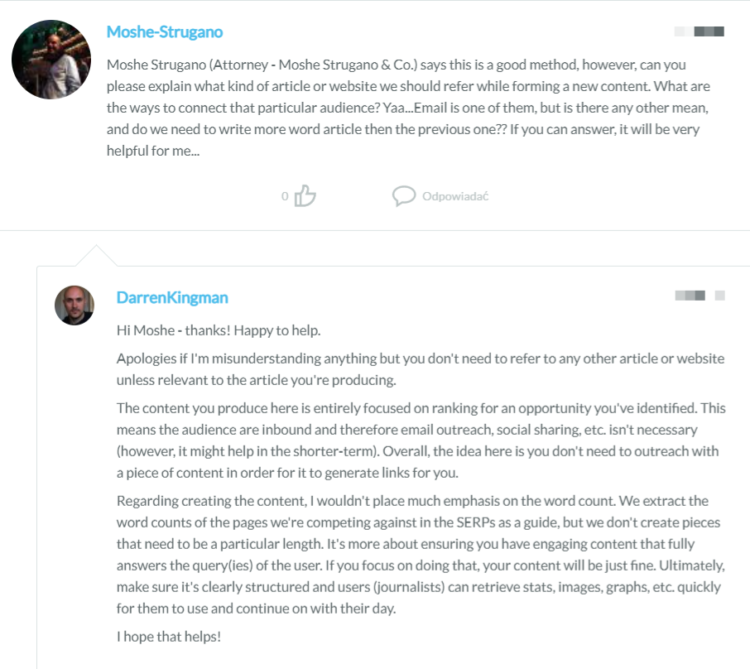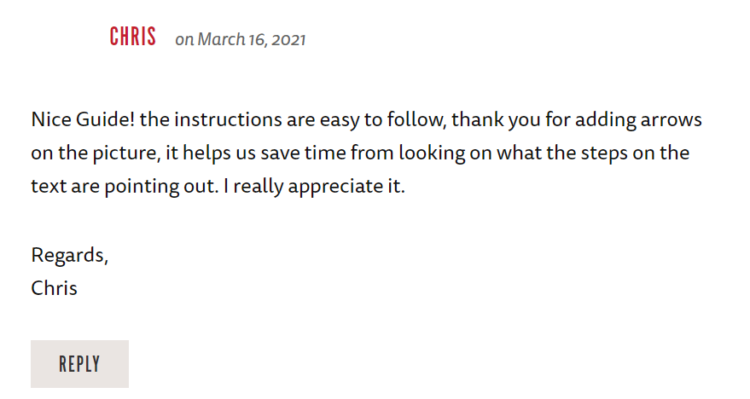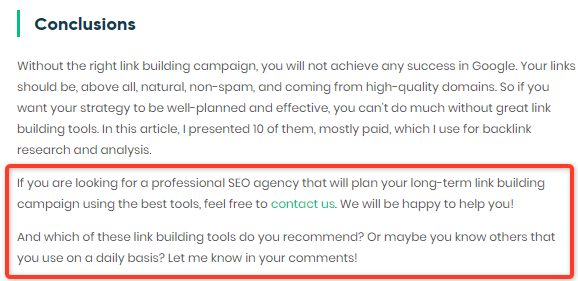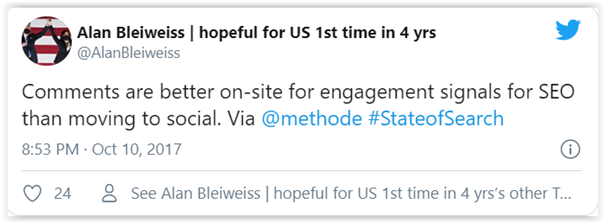Why Is It Beneficial to Encourage Blog Comments and How to Do It?

Are you a blog, portal or website owner? Then, it’s a good idea to enable blog commenting. Perhaps now you’re wondering why to do it and whether it doesn’t result solely in SPAM. Well, it turns out that everything depends on you, the type of content you create and many other factors. Keep reading to find out why it’s worth encouraging blog comments and how to actually do it.
Table of Contents:
- Blog comments: why are they helpful?
- How to encourage blog comments?
- How can blog commenting support SEO?
Blog comments: why are they helpful?
Apart from sharing the author’s expertise and insights, blogs can be used as a medium for exchanging worldviews with other Internet users. Below you can see a list of reasons proving that blog commenting helps SEO:
- Making users visit your website again
If someone asks a question or leaves a comment, the chances are that they’ll come back to your website to see if you replied. That’s one of the reasons why it’s not a good idea to leave any users’ feedback unattended. Subsequent visits to your website equal an increased number of page impressions, a higher probability of users clicking on an ad, getting acquainted with your offer, or making a conversion.

- Increasing content credibility
What do you think if the comments section under a given entry is turned off? Probably you’d be concerned that the content isn’t reliable, the author isn’t comfortable with users’ opinions, or tries to share fake news. Very frequently companies disable blog comments when they publish sponsored content as they’re worried about negative reactions. And after all, this content should work in the company’s favor. Of course, making it impossible for users to leave a comment doesn’t necessarily mean that the text doesn’t bring any value but it can certainly give such an impression.
- Providing extra intellectual value
Have you created quality content that attracted a lot of attention? If users constantly write new comments and you resolve their doubts, then, you work together to develop even more valuable texts. This way, users may decide to share your content on their social media as a token of appreciation.
- Building relationship with readers
If you actively moderate entries after they’re published, add comments, exchange opinions with readers, then, you don’t only position yourself as an expert but also build relationships with readers. Users will be revisiting your page to see if you published new entries or comments. Perhaps they’ll even subscribe to the newsletter to get notifications about newly published posts. It’s also a great idea to offer users a functionality thanks to which they’ll receive an email every time someone replies to their comments.
- Free content
New comments mean acquiring unique website content for free. It also signalizes Google that a particular entry is popular, therefore, it may contribute to improving its visibility in the organic search results.
- Knowledge test
Do you consider yourself to be an expert in the field? If you’ve written an attractive entry but you aren’t entirely sure how readers are going to react to it, then treat comments as a test that allows you to check the opinions of other users. Keep in mind that you may get different types of feedback, including unfavorable remarks, so be ready for that. Nevertheless, remember that every quality comment provides you with an opportunity to learn something new.
Are you still wondering if blog commenting is something you should focus on? The answer to this question is simple – of course! But do you know what to do to encourage users to write comments and share opinions about your entry?
How to encourage blog comments?
1. Create substantive content
It’s not about quantity but about quality – sometimes it’s better to prepare only a few posts a month to ensure that they’re full of substantive content. Obviously poor quality content may also encourage comments, however, probably not the positive ones you dream about. It’s certainly a good idea to share tips or unprecedented pieces of information. We realize that this task isn’t a piece of cake but the efforts will certainly pay off. Controversial content may also attract users and make them leave comments, however, the reactions may not always meet your expectations.
2. Don’t require setting up an account
If you want to discourage users from writing comments, require them to set up an account. However, in all probability, that’s not your objective. Bloggers sometimes decide on mandatory registration in order to avoid spam. However, this issue can also be solved with appropriate security solutions and it’s definitely a better idea, as it’s more than likely that a vast majority of users won’t decide to set up an account only to be able to leave a comment.
Of course, there are also blogs with engaged communities. In this case, obligatory registration doesn’t bother users. Still, if you’re just starting your blogging adventure, offer people the possibility to comment on your entries without having to create an account.
3. Share content in social media
Inform users about new content if you run a fan page with a substantial number of followers. Some of them will certainly click on the link and go through the article or even write a comment.
4. Ask for ideas for subsequent entries
Internet users who value your content and perceive you as an expert in the industry may provide you with suggestions regarding subsequent entries which gives you an opportunity to discuss certain issues and resolve doubts. Ask your readers to share their ideas in the comments section.
5. Comment on other blogs
Visit other blogs. It would be great if they were thematically related to your activity. Leave unique comments or even direct the author and readers to your entry but make sure that you offer substantive content. If you write something like “cool post, check out my blog”, it’s very likely that it’ll be considered spam and deleted.
6. Allow users to leave a link
Many users comment on blog entries only to obtain links to their websites which is supposed to improve their visibility. If a website visitor publishes a quality comment, you can allow them to leave a link. According to Google, it’s best to use the rel=”ugc” attribute for such content.
UGC which stands for user-generated content indicates to Google algorithms that the link was provided by the user. However, as you can see below, Google also recommends removing the rel=”ugc” from links added by users who write quality comments. As a result, their websites can gain more thanks to such a link because it may strongly impact the visibility in SERPs.
7. Ask a question in the blog post content
Encourage discussion. Perhaps users will be willing to share their expertise and experience. Surely, they’ll have completely different opinions on numerous issues so be prepared for that. Thanks to the discussion, you can also draw precious conclusions – after all, it’s one of your main goals.
How can blog commenting support SEO?
Blog commenting can bring you numerous benefits and improve your visibility on Google. Below you can see a list of advantages of active discussions taking place under your blog posts:
- Being displayed for a wider range of keywords
A user who co-creates your website content may apply a number of words you didn’t use in the blog post. What does it mean? Well, the entry is likely to be displayed for a wide range of keywords used by readers who left comments.
- Updating content
If Google robots notice new content every time they visit your website, it may indicate that your page is popular and noteworthy which will translate into its greater visibility in the SERPs.
- Obtaining backlinks to the site
Let’s assume that a user read your entry, didn’t approve of its content and discussed the issue with you in the comments. Eventually, the reader came to the conclusion that you were right. Perhaps he or she will want to put other users or friends right and thus provide the link to your entry.
Remember that for Google, website comments are a more important ranking factor than social media comments. This is confirmed by a statement from Gary Illyes quoted by Alan Bleiweiss. Although it was said in 2017, rather little has changed since then.
- External linking
Your responses to users’ comments may create an opportunity to provide links to your other blog posts that discuss particular aspects. Thanks to it, you can improve the visibility of your subpages, generate more impressions and decrease bounce rate – users surely won’t leave your page after reading only one entry.
So is it beneficial to encourage blog comments? Definitely! However, remember that even though blog commenting can bring your website a number of benefits, it requires a certain dose of commitment to moderate content and reply to published remarks.







Hi, This is an informative article. Thanks for sharing your experience & knowledge.
Thanks for this blog.
Very informative blog post, really love to read it. Keep up the good work.
Blog comments and SEO certainly go hand in hand when done gracefully.
I loved how you used this article to show us the benefits of blog commenting for SEO and told us that we should do it more often. I’m going to be sure, when I make my next post, to comment on your blog as well!
Really informative article. Looking forward to similar articles. I have learned a lot about the importance of Blog Comments from your blog.
Very nice article to refer to. Hoping to read more in the coming days.
I appreciate you for this wonderful article on SEO. It was very useful.
Very informative article! It is a big help for us who’s learning about blog commenting.
Thank you for sharing!
Thanku for sharing this cruicial data about blog commenting .Mesmrizing site..
That is a very practicable article and very impressive.